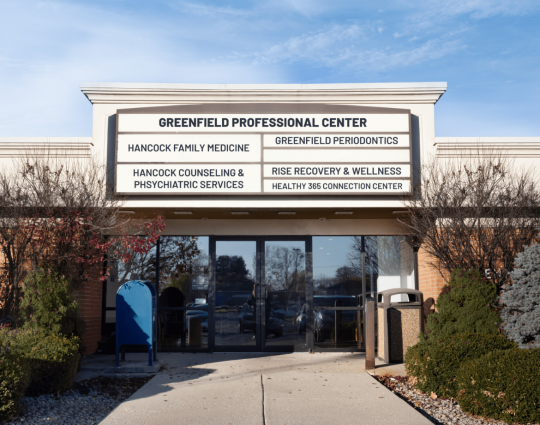Hancock Health Connection Center
The Hancock Health Connection Center helps people with community resources to meet social needs and prevention/intervention services related to behavioral health needs. We serve Hancock County residents, patients and Hancock Health associates.

Über diesen Standort
The Hancock Health Connection Center is a confidential and comprehensive approach to making health possible for Hancock County residents, patients and Hancock Health associates. We are a hub for community resources to meet social needs and prevention and intervention services related to behavioral health needs.
A team of support navigators and System of Care outreach programs offer many services including QPR suicide prevention training, ACE Interface training, treatment for tobacco cessation, peer recovery services, CRAFT support groups, and more. Because of our strong System of Care, we can connect you and your family with local providers whose services encompass:
- Gesundheitspflege
- Social needs
- Psychische Gesundheit
- Substance misuse treatment
- Ausbildung
- Glaubensgemeinschaften
- Disabilities
- Kinderfürsorge
- Early Childhood
- Justice system
- Gemeinschaftskoalitionen
- Seniorendienste
- Kommunalverwaltung
- Jugend und Familien
- Sonstige soziale Dienste
Unsere Support-Navigatoren beseitigen Hürden bei der Pflege und verbinden Sie mit den Diensten, die Sie zur Unterstützung Ihres Körpers, Geistes und Ihrer Seele benötigen.
Geist
Mental illness can affect anyone. Just because we can’t always see it doesn’t mean it’s not there. The Hancock Health Connection Center team is here to help you connect with local mental health resources.
Körper
Our health is heavily affected by the way we care for our bodies—our dietary and exercise habits, coping mechanisms, and use of drugs or alcohol. We have a wealth of social and physical wellness resources available: Hancock Wellness Centers have state-of-the-art gym equipment, and we offer many classes and support groups.
Geist
Spirituelles Wohlbefinden kann ein wichtiger Teil des täglichen Lebens sein. Die Suche nach einer örtlichen Glaubensgemeinschaft kann sowohl in Zeiten der Gesundheit als auch in Zeiten der Not von großem Nutzen sein.
Unterstützung für unsere Gemeinschaft
Mental Health & Substance Misuse
Hancock Health Behavioral Services can help adults affected by substance use disorder and co-occurring mental illnesses.
Our team provides a nonjudgmental and welcoming space, meeting you where you are and providing compassionate substance use disorder treatment. Services include:
- Einzel- und Gruppentherapie
- Fallmanagement zur Überwindung von Hindernissen und Beseitigung von Hindernissen für Ihre Genesung
- Medikamentengestützte Behandlung bei Opioid- und Alkoholkonsum
- Medikamentenmanagement bei psychiatrischen Erkrankungen
Patients can be referred via a Hancock Health physician, a support navigator at the Hancock Health Connection Center, or any of our local community partners. If you or someone you know could benefit from our substance use disorder treatment and co-occurring mental illnesses program, please reach out to the Hancock Counseling and Psychiatric Services today by calling (317) 468-6200.
Justice Navigator-Programm
Die Healthy Community Response Collaborative (HCRC) schafft Wege der kollaborativen Betreuung für Personen, die an verschiedenen Stellen des Justizsystems tätig sind.
The Hancock Health Connection Center has justice focused support navigators who work with individuals exiting or involved with various points of the justice system.
Peer Recovery Services
Peer support specialists are people who have been successful in the recovery process who help others experiencing similar situations. Through shared understanding, respect, and mutual empowerment, peer support Specialists help people become and stay engaged in the recovery process and reduce the likelihood of relapse. Peer support services can effectively extend the reach of treatment beyond the clinical setting into the everyday environment of those seeking a successful, sustained recovery process.
Hancock County CIT Training
CIT training stands for Crisis Intervention Team training. It’s a specialized law enforcement training program that aims to improve police interactions with individuals experiencing mental health crises. This training equips officers with the skills to de-escalate situations, understand mental illness, and connect individuals with appropriate mental health resources.
WATCH AN INFORMATIVE VIDEO HERE!
Benefits of CIT Training:
- Improved officer and consumer safety:
- CIT training aims to improve officer and individual safety during mental health crises.
- Reduced arrests:
- CIT programs help to reduce arrests of individuals with mental illness by diverting them to mental health services.
- Increased access to treatment:
- CIT training helps to connect individuals with mental health services, promoting treatment and recovery.
- Cost savings:
- Diversion programs like CIT can lead to cost savings for communities by reducing the reliance on incarceration.
- Improved officer attitudes:
- CIT training has been shown to improve officer attitudes and knowledge about mental illness.
Residents of Hancock County calling 911 for a mental health and/or substance misuse crisis can request a CIT Officer.
Hancock County Mobile Response Team
What We Do
Hancock County’s Mobile Response Team (MRT) is a group of highly trained professionals who work collaboratively with law enforcement and community stakeholders in helping residents with mental health and substance use challenges. Referrals come to MRT from GPD, HCSD, Hancock County Probation, Hancock County Helping Courts, several Hancock County community partners, Community Fairbanks Access Department, and county self-referrals. Rapid response is provided within 24-48 hours to address needs and link individuals with further treatment when appropriate.
When To Call
When responding to situations where mental health or substance misuse concerns are present, but an individual is not in immediate danger of harming themselves or someone else.
How MRT Works
Triage: Trained professionals receive the initial call and triage with MRT team
Mobile Response: If care is needed beyond a phone call, MRT team member will go to the individual and work to resolve the crisis
Mobile Stabilization: MRT offers short-term assistance and case management services inside and outside of the home to decrease recurrence
After Care: Follow-up and referral of care is available to the individual to ensure a smooth transition to any support and services that may be necessary
MRT INTERVENTIONS INCLUDE:
- Face-to-face brief supportive interventions
- Assessment of the individual’s mental health and substance misuse needs
- When necessary, facilitate referral/admission to inpatient hospitalization
- Coordination of appropriate and available community-based services for on-going treatment and follow-up
- Behavioral health support for individuals ages 5+
When MRT Is Not The First Line Of Intervention:
- An individual is actively engaged in a suicide attempt
- An individual requires immediate medical attention
- An individual is violent, aggressive, destroying property, physically harming or threatening others
KURSE ANGEBOTEN
We routinely host classes and support groups to support prevention, intervention, treatment, and recovery for our community members. Recurring classes offered at the Hancock Health Connection Center include:
Gemeinschaftsstärkung und Familientraining (CRAFT) — Eine fortlaufende Selbsthilfegruppe im Workshop-Stil für Familien, die von Sucht betroffen sind. Die Gruppe ist kostenlos und findet über einen Zeitraum von 12 Wochen statt.
Fragen, überzeugen und empfehlen Sie ein Suizidpräventionstraining (QPR) – Trainiert Einzelpersonen darin, Anzeichen von Selbstverletzung und Selbstmordgedanken bei Angehörigen zu erkennen. Unser Team wird durch das QPR Institute geschult. See available classes.
Erhebe dich darüber — An annual event that offers space for adults and kids to talk about emotional health, wellness, self-care and connect with resources. The FREE event includes vendors, snacks and several self-care stations.
Stressmanagement bei kritischen Vorfällen (CISM) — Helps minimize the potentially harmful stress-related symptoms associated with traumatic incidents that occur while on the job, including promoting a healthy response and accelerating the healing process for individuals. Contact the Hancock Health Connection Center to request a debriefing for your organization.
ACE Interface Training — ACE Interface Trainings are a FREE 2-hour training that offers a proven educational framework about the ACE study, along with neurobiology explaining why ACEs (Adverse Childhood Experiences) have so much effect in people’s lives, including brain development and how our bodies respond to stress. Additionally, trainings showcase what we can all do to dramatically improve health and resilience for this and future generations. See available classes.
VERBINDEN SIE SICH MIT EINEM SUPPORT-NAVIGATOR
Unser Team von Support-Navigatoren bietet ein vertrauliches offenes Ohr und hilft Patienten, lokale Ressourcen zu finden, die ihnen helfen, die Herausforderungen des Lebens zu meistern. Wir haben Hunderte sinnvoller Beziehungen zu lokalen Organisationen und Einzelpersonen aufgebaut und arbeiten mit allen Altersgruppen zusammen, um sicherzustellen, dass die Bedürfnisse unserer Gemeinschaft erfüllt werden.
Rufen Sie uns an
COMMUNITY-RESSOURCEN
Zu unserem Engagement für das Gesamtwohl unserer Gemeinschaft gehört es, unseren Patienten dabei zu helfen, Zugang zu den Ressourcen zu erhalten, die sie benötigen – auch wenn sie sich außerhalb des Hancock Health-Netzwerks befinden.

- Kinder und Familie
- Bildung und Beschäftigung
- Essen und Kleidung
- Allgemein
- Healthcare
- Hotlines
- Wohnen und Versorgung
- Rechtsberatung
- Psychische Gesundheit
- Dienstleistungen für Menschen mit Behinderungen
- Dienstleistungen für Senioren
- Dienstleistungen für Veteranen
- Substance Misuse
- Selbsthilfegruppen
- Transportunterstützung

MEET THE TEAM
 Since 2002, Amanda has dedicated herself to helping others improve their lives. A Hancock Health associate since 2010, she uses her passion to empower and motivate, and to help others see how small changes can have a big impact. Her vision is to continue to cultivate a culture of wellness in Hancock County, with a focus on mental health and substance use treatment. Amanda received her bachelor’s from Purdue University and her master’s in social work from IUPUI. She was born and raised in Greenfield, where she lives with her fiancé, Adrian, and their daughter, Helen. She enjoys vacationing with family, running half marathons, and spending time in nature.
Since 2002, Amanda has dedicated herself to helping others improve their lives. A Hancock Health associate since 2010, she uses her passion to empower and motivate, and to help others see how small changes can have a big impact. Her vision is to continue to cultivate a culture of wellness in Hancock County, with a focus on mental health and substance use treatment. Amanda received her bachelor’s from Purdue University and her master’s in social work from IUPUI. She was born and raised in Greenfield, where she lives with her fiancé, Adrian, and their daughter, Helen. She enjoys vacationing with family, running half marathons, and spending time in nature.

 Tondra Crum Worley is a Licensed Mental Health Therapist as well as a Registered Play Therapist Supervisor. She is the Clinical Manager for Hancock Counseling & Psychiatric Services. Tondra is a co-coordinator of the Hancock County CISM team, working with first responders, health care workers and the community as they face traumatic events in their daily work. Tondra has worked in various mental health settings such as school based, inpatient, residential and outpatient. Her career has focused on working with youth, adolescents and their families that are dealing with trauma. Tondra is a member of the Association for Play Therapy and has served as the state president on the national ethics committee and is a graduate of the leadership academy. Tondra’s passion is building trauma-informed mental health services, mentoring therapists, and bringing engaging mental health services to youth and adolescents.
Tondra Crum Worley is a Licensed Mental Health Therapist as well as a Registered Play Therapist Supervisor. She is the Clinical Manager for Hancock Counseling & Psychiatric Services. Tondra is a co-coordinator of the Hancock County CISM team, working with first responders, health care workers and the community as they face traumatic events in their daily work. Tondra has worked in various mental health settings such as school based, inpatient, residential and outpatient. Her career has focused on working with youth, adolescents and their families that are dealing with trauma. Tondra is a member of the Association for Play Therapy and has served as the state president on the national ethics committee and is a graduate of the leadership academy. Tondra’s passion is building trauma-informed mental health services, mentoring therapists, and bringing engaging mental health services to youth and adolescents. Laura is a Board Certified Chaplain serving the community within Hancock Health. With over 25 years of experience, Laura has dedicated her career to integrating spiritual, emotional, and physical health. Her passion lies in supporting patients, staff, and the community by providing compassionate care that addresses the whole person. Her personal wellness journey has empowered her to share the healing she has experienced, offering tools and support that enable others to navigate life’s highs and lows. By fostering this connection, spiritual care serves as a foundation for emotional, physical, and mental well-being, creating a ripple effect of healing and growth
Laura is a Board Certified Chaplain serving the community within Hancock Health. With over 25 years of experience, Laura has dedicated her career to integrating spiritual, emotional, and physical health. Her passion lies in supporting patients, staff, and the community by providing compassionate care that addresses the whole person. Her personal wellness journey has empowered her to share the healing she has experienced, offering tools and support that enable others to navigate life’s highs and lows. By fostering this connection, spiritual care serves as a foundation for emotional, physical, and mental well-being, creating a ripple effect of healing and growth